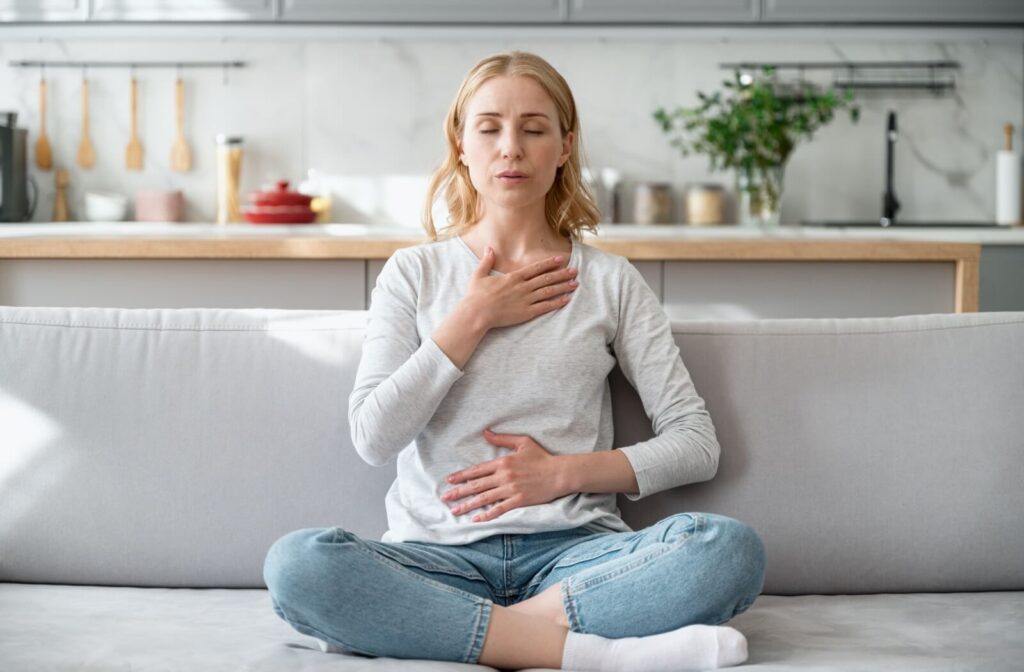
If you’ve been dealing with anxiety, you’ve probably caught yourself asking at some point, “How long will this last?” It’s a fair question—anxiety, whether tied to life in general or specific situations, can be exhausting and affect your mental health.
While everyone experiences anxiety, the duration of symptoms can vary based on the cause. Anxiety can be short-lived or persistent and severe. Professional help through counselling or therapy can help you cope and reduce your symptoms.
What Is Anxiety?
Anxiety is a normal and natural emotion that everyone experiences from time to time. It can manifest as worry, fear, nervousness, or unease about something. Occasional anxiety is a common part of life. It may even be beneficial, helping us prepare for important events or avoid dangerous situations.
However, when anxiety becomes excessive or uncontrollable, it can have a significant impact on daily life. In some cases, it can even develop into an anxiety disorder, such as generalized anxiety disorder, social anxiety disorder, panic disorder, or specific phobias.
Some common symptoms of anxiety include:
- Restlessness or feeling on edge
- Difficulty concentrating
- Muscle tension and aches
- Fatigue
- Irritability
- Racing heart or shortness of breath
- Sweating and trembling
Why Anxiety Can Feel Like It’s Never-Ending
Anxiety’s root lies deep within both our biology and psychology. When you experience anxious thoughts or sensations, your brain activates your body’s survival instincts, flooding you with adrenaline. The challenge is that sometimes this system overreacts, keeping your mind and body heightened even when the threat itself is gone.
How Long Does Anxiety Last?
The duration of anxiety often depends on the context and its root cause. Anxiety isn’t one-size-fits-all, but it generally falls into these categories.
Acute (Situational) Anxiety
Acute anxiety is what you might feel before or during a specific event—like speaking in public, flying for the first time, or going to a job interview. It’s your body’s natural “fight or flight” response kicking in and meant to keep you alert.
The intensity of acute anxiety tends to peak just before the event and diminishes soon after the situation resolves. For instance, if you felt anxious about a dentist appointment, your heart might race beforehand but these feelings often fade after the procedure after you’ve made it through.
Chronic Anxiety
Chronic anxiety, including generalized anxiety disorder, is persistent and less dependent on specific situations. It can last for at least 6 months, but can also be a lifelong condition. If chronic anxiety sounds familiar, know that help is available. Therapy, relaxation exercises, and targeted strategies can help reduce its symptoms over time.

How to Cope with Anxiety
While you may not always control when anxiety shows up, you can follow these tips to help reduce its intensity and duration.
Breathe with Intention
Controlled breathing redirects your focus and helps tell your body to calm down. Try this breathing exercise with a hand placed on your stomach to feel it inflating and deflating:
- Take a long, deep breath through your nose.
- Hold for a few seconds.
- Exhale through the mouth.
- Repeat as many times as you can, or until symptoms subside.
There are many different types of breathing excersizes available, so play around with different ones until you find one that works for you.
Ground Yourself in the Present
You can also use grounding techniques when your anxiety feels overwhelming. Focus on your 5 senses. What can you see, hear, smell, taste, and feel? By engaging and focusing on each sense, you can help bring yourself back to the present moment.
Challenge the Thought, Not Yourself
Reframing your anxious thoughts is another useful coping mechanism for anxiety. An anxious mind often says, “What if something goes wrong?” Being able to recognize this as just a thought, not a fact, is helpful in challenging anxiety’s power of your actions. Instead of letting your anxious thoughts race, acknowledge your thought gently, then reframe it more realistically or positively.
Practice Self-Compassion
Simply acknowledging that it’s okay to feel anxious is a good place to start to cope with anxiety. It’s a natural response and not something you should feel ashamed of. Practicing self-compassion helps you remind yourself that you’re taking steps toward better mental and physical health.
Seek Professional Support
If anxiety persists or feels unmanageable, reach out to a therapist or counsellor trained in managing anxiety. They can walk alongside you, offering personalized strategies to feel empowered and in control of your anxiety.
In addition to traditional therapy options, some people may also benefit from seeking support from a nurse practitioner trained in mental health. They can provide treatment plans and medication management services tailored to an individual’s needs. With the proper support and tools in place, you can learn to manage your anxiety and lead a more peaceful and fulfilling life.
How One to One Wellness Can Help
Anxiety may come and go, but it doesn’t have to linger indefinitely. Whether tied to a specific event or a more chronic experience, there are ways to help reduce its hold and shorten its duration. Taking the steps to learn, prepare, and address your anxiety means you’re already on a path to improvement.
If anxiety is weighing on your mind, book an appointment with One to One Wellness to help you cope, clear your mind, and lighten your load. We’re here for you.





